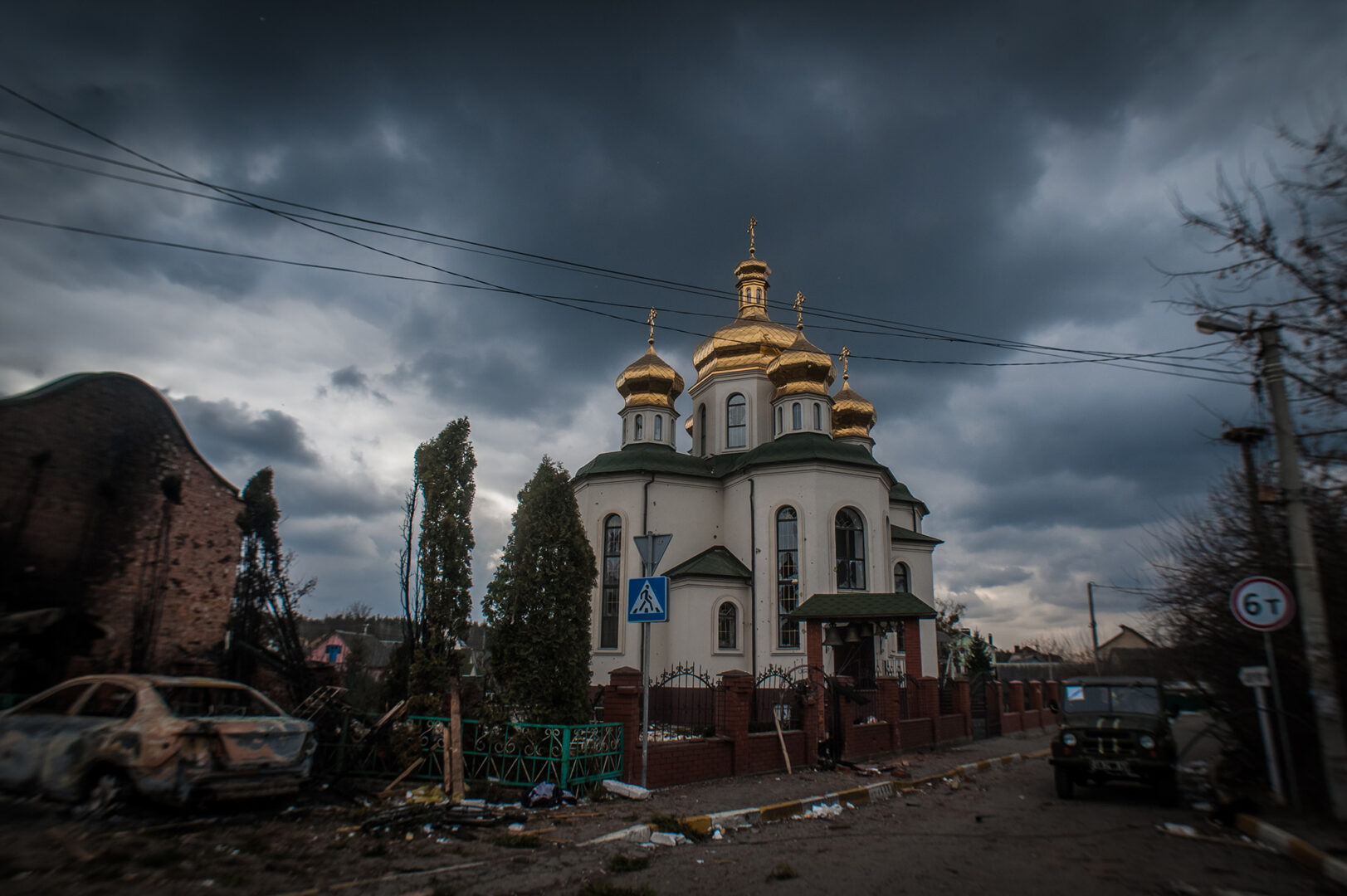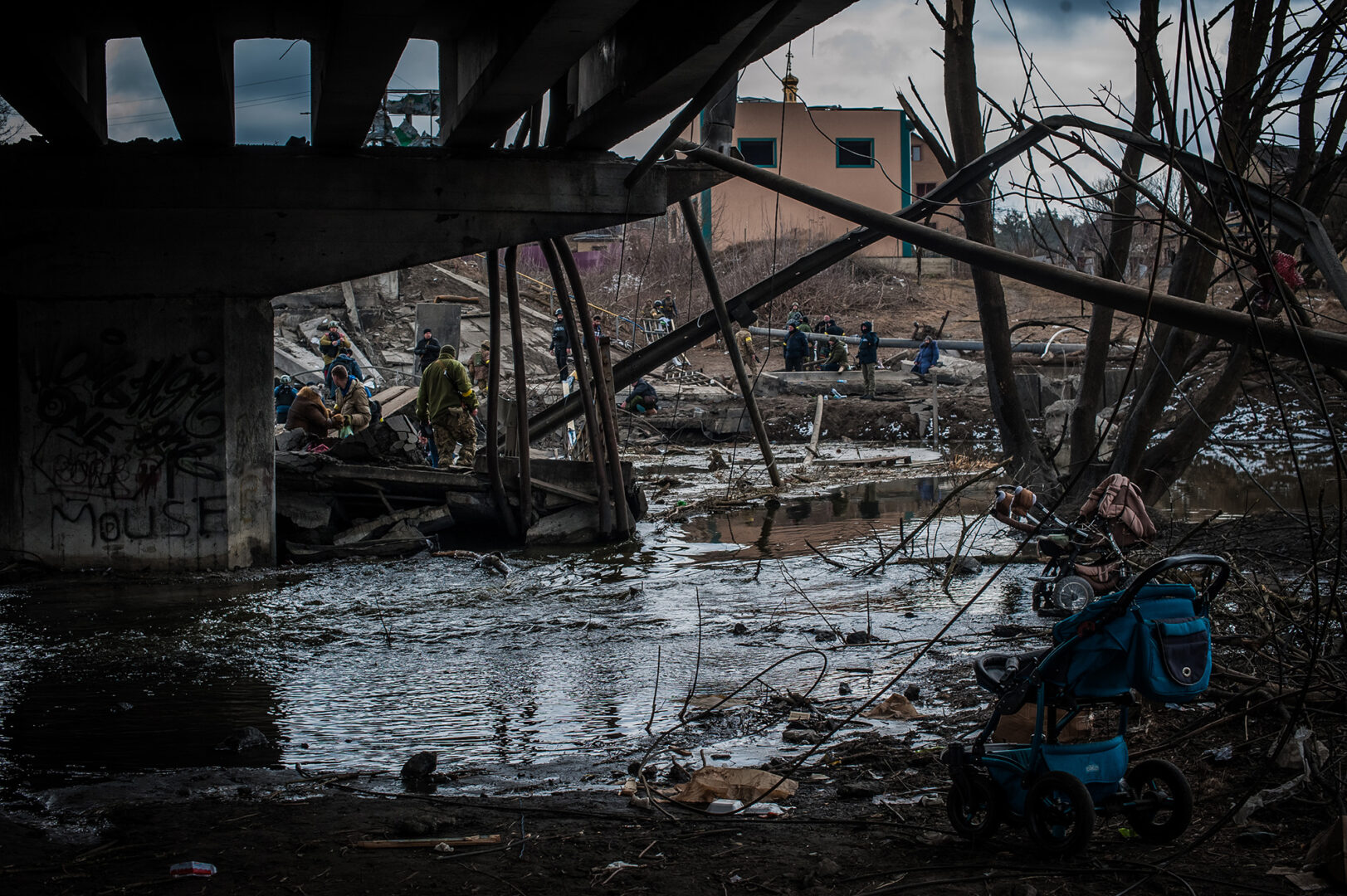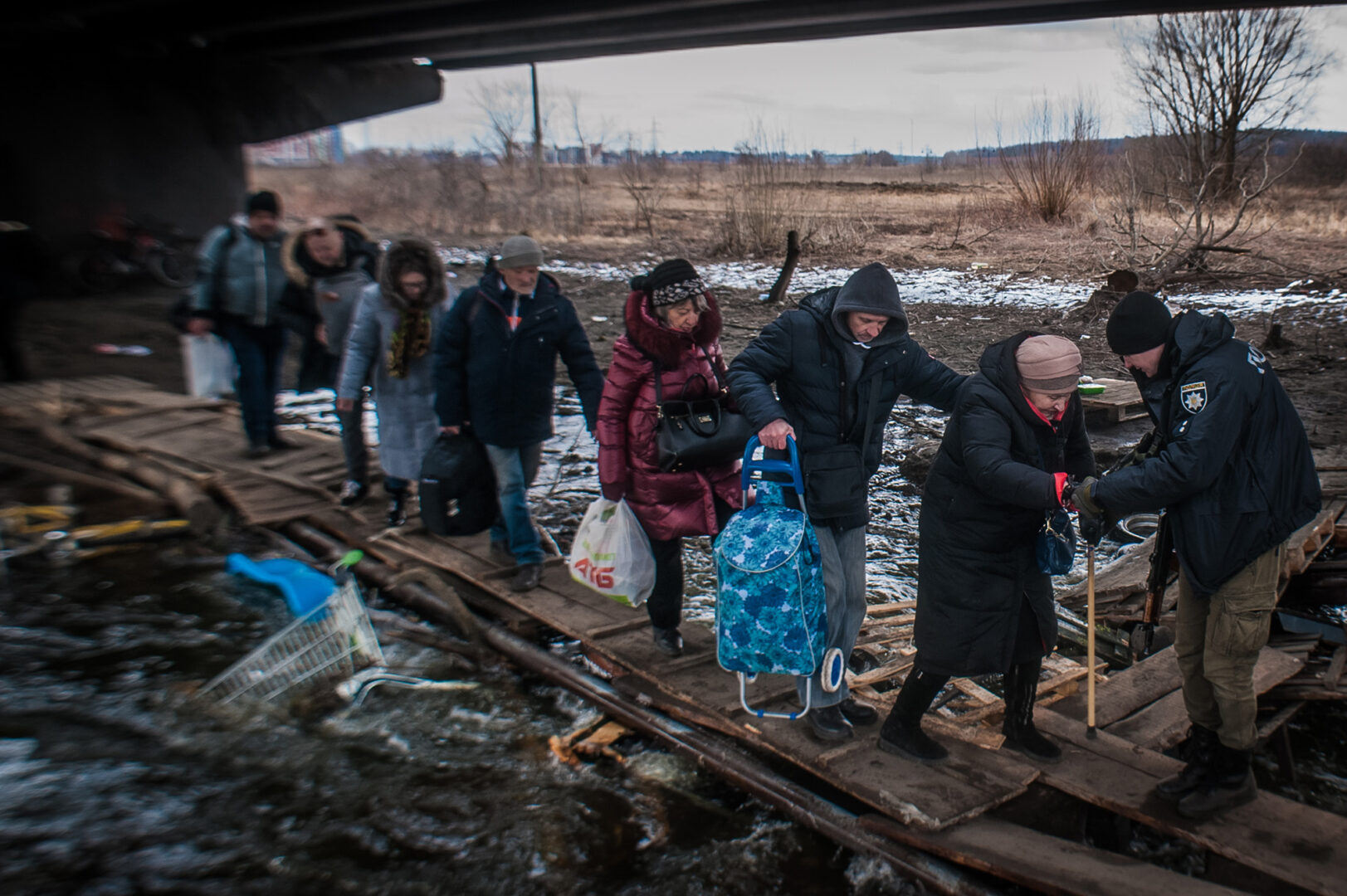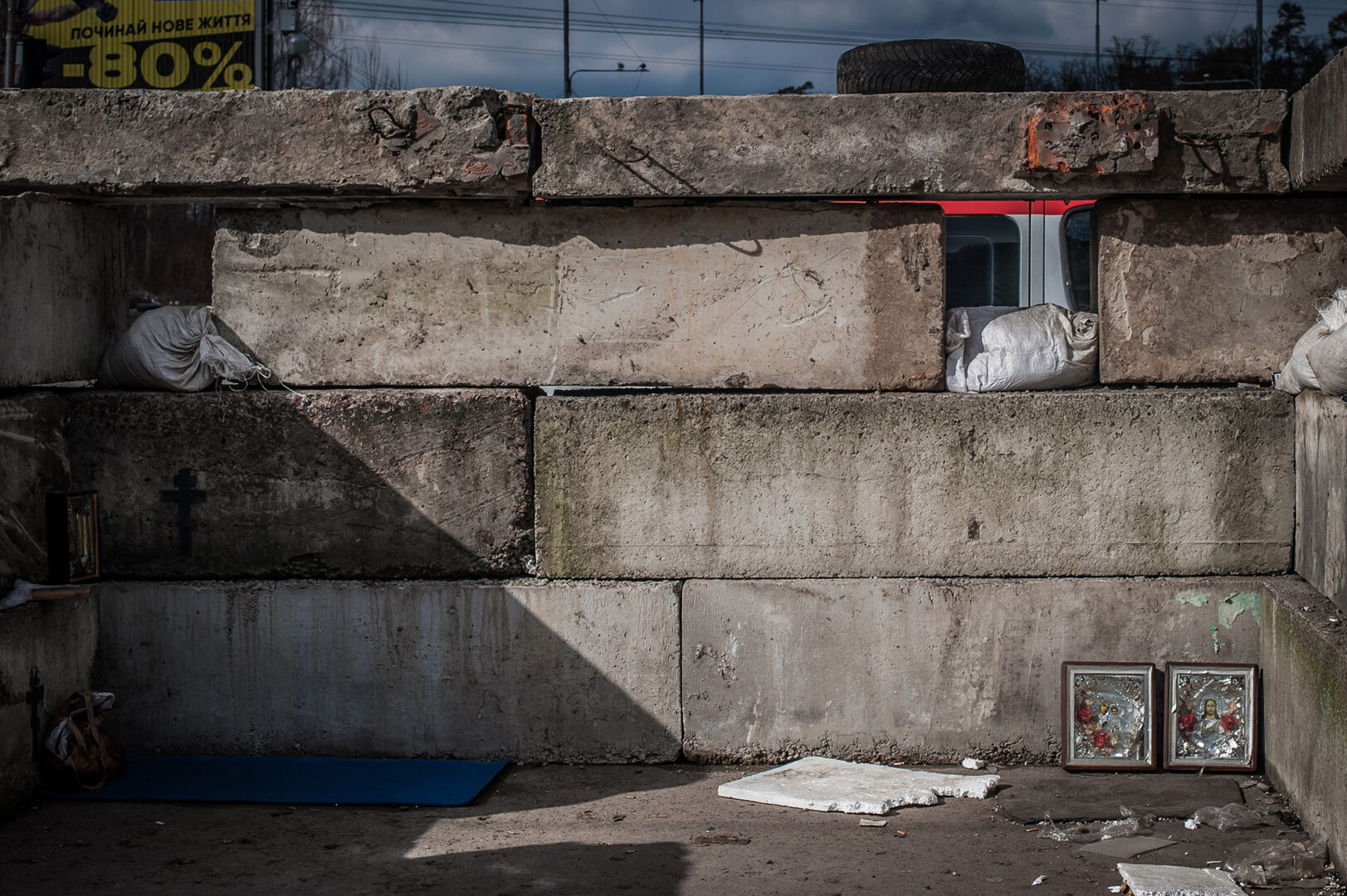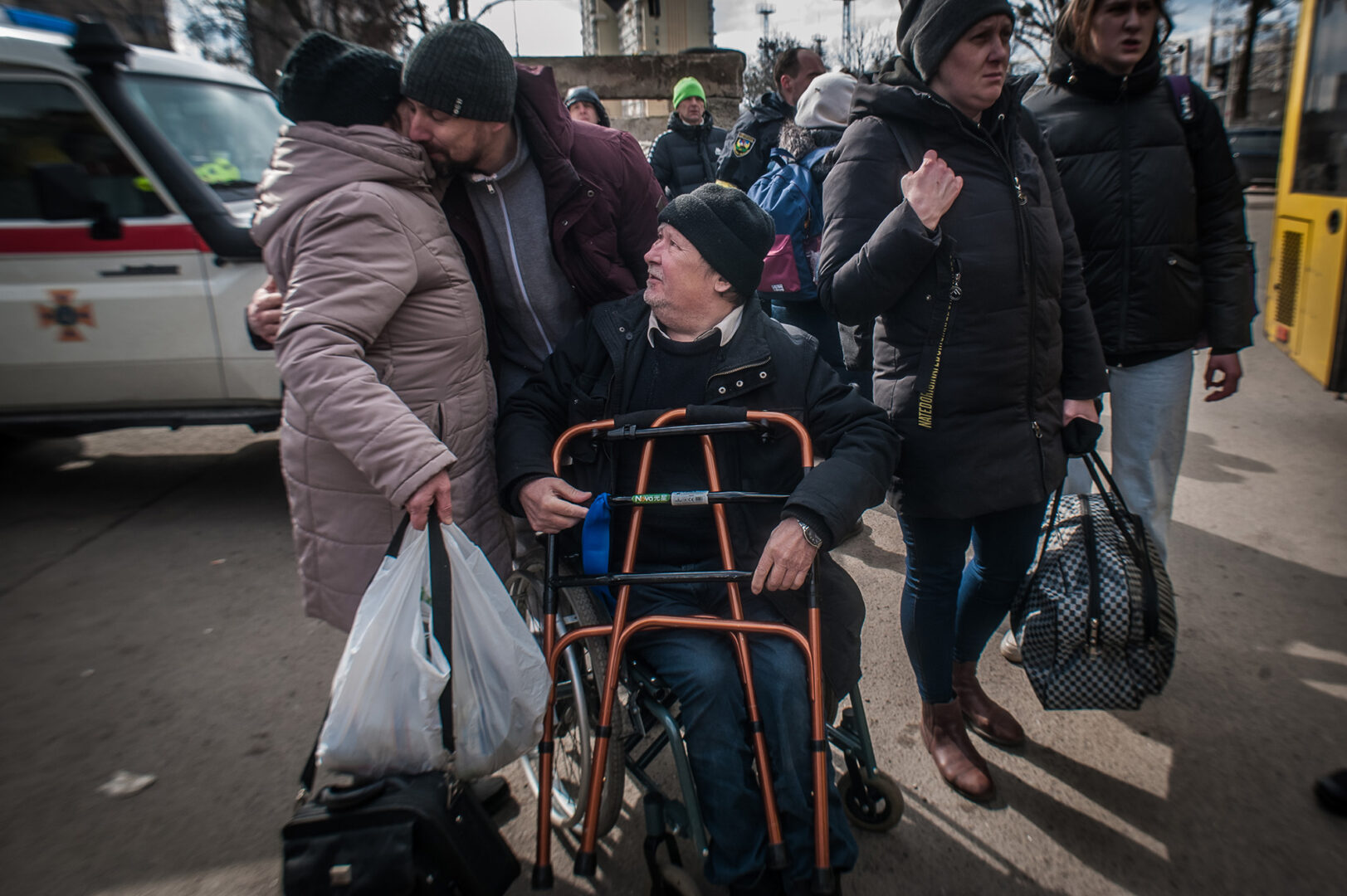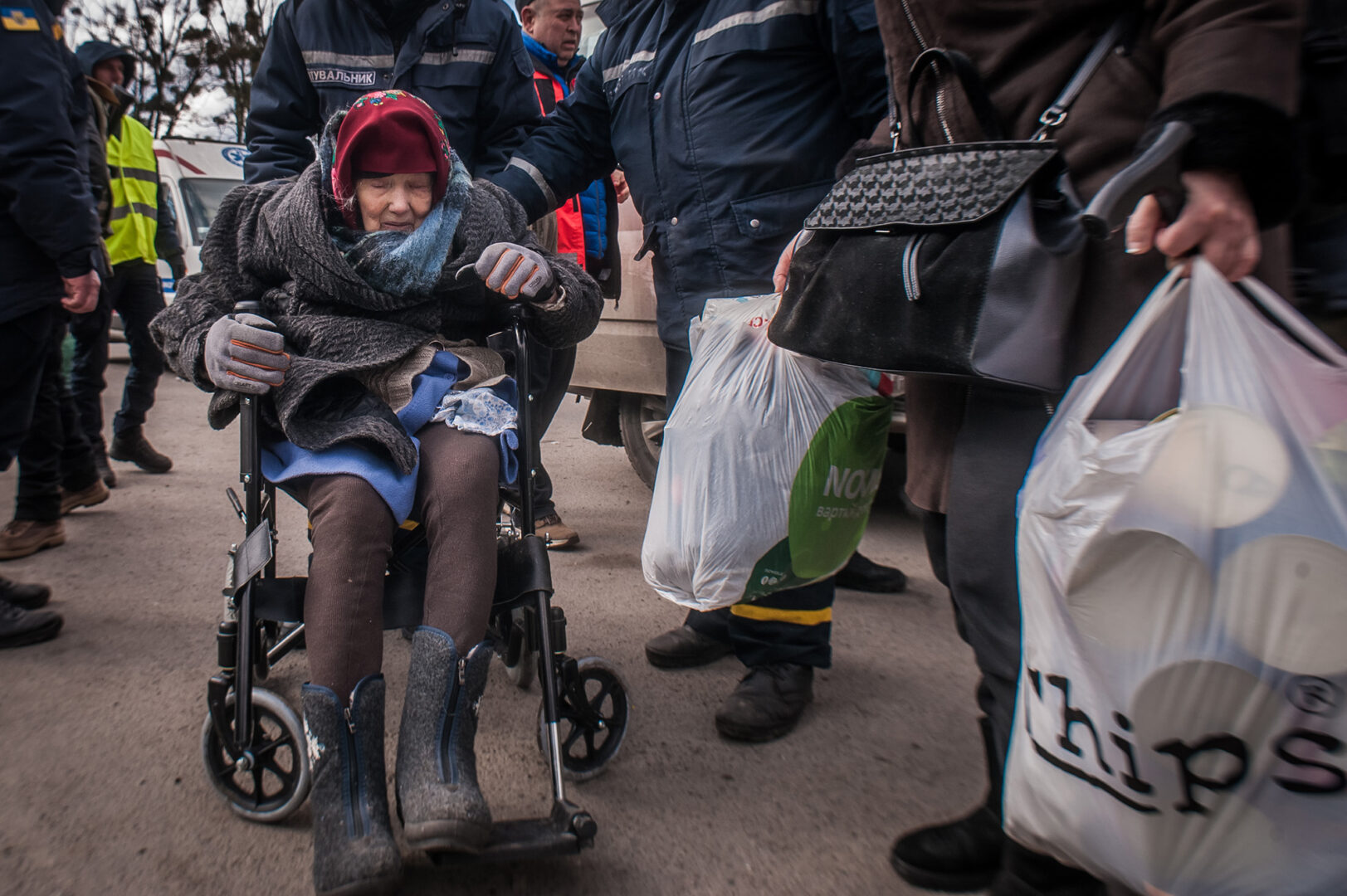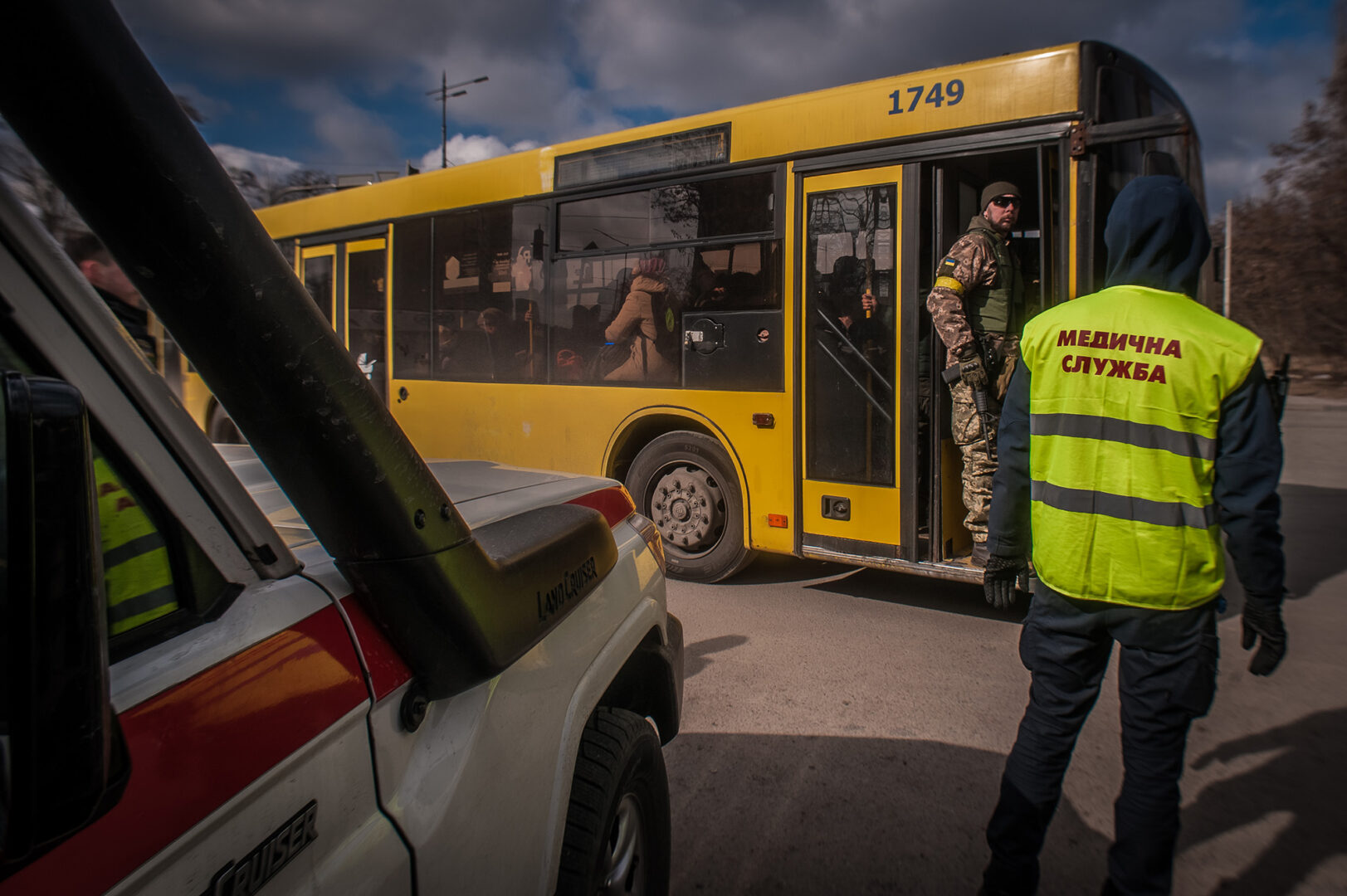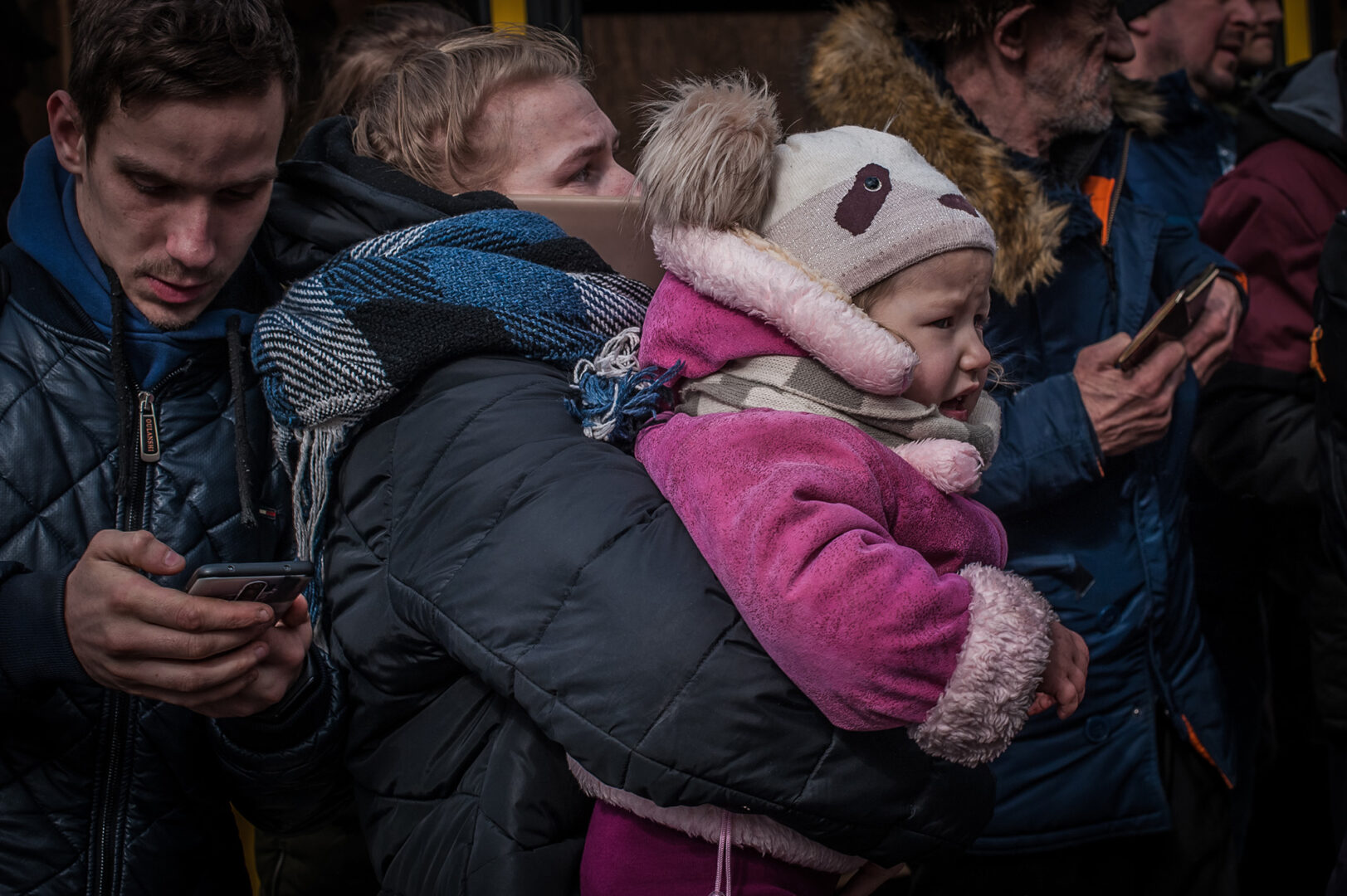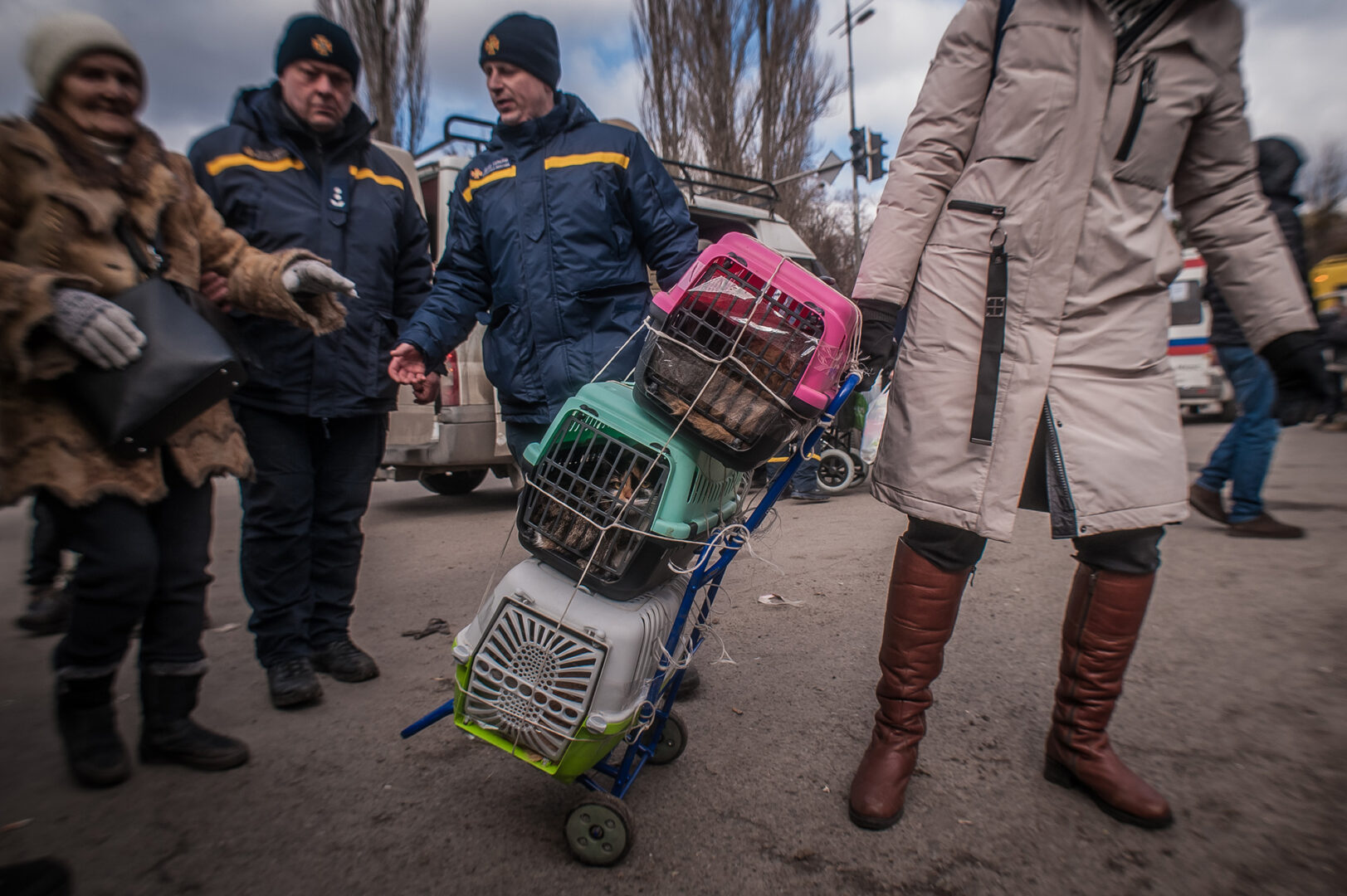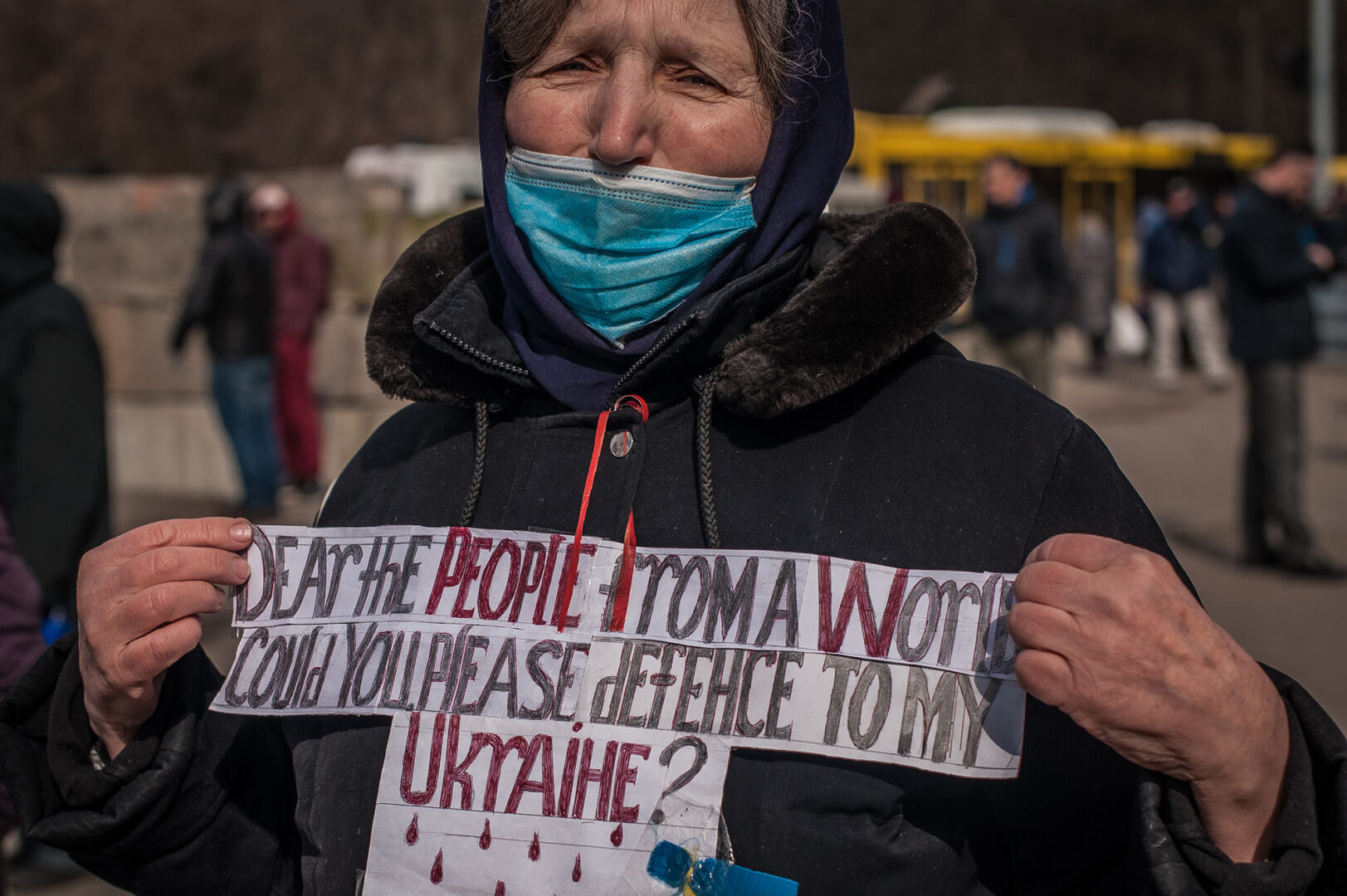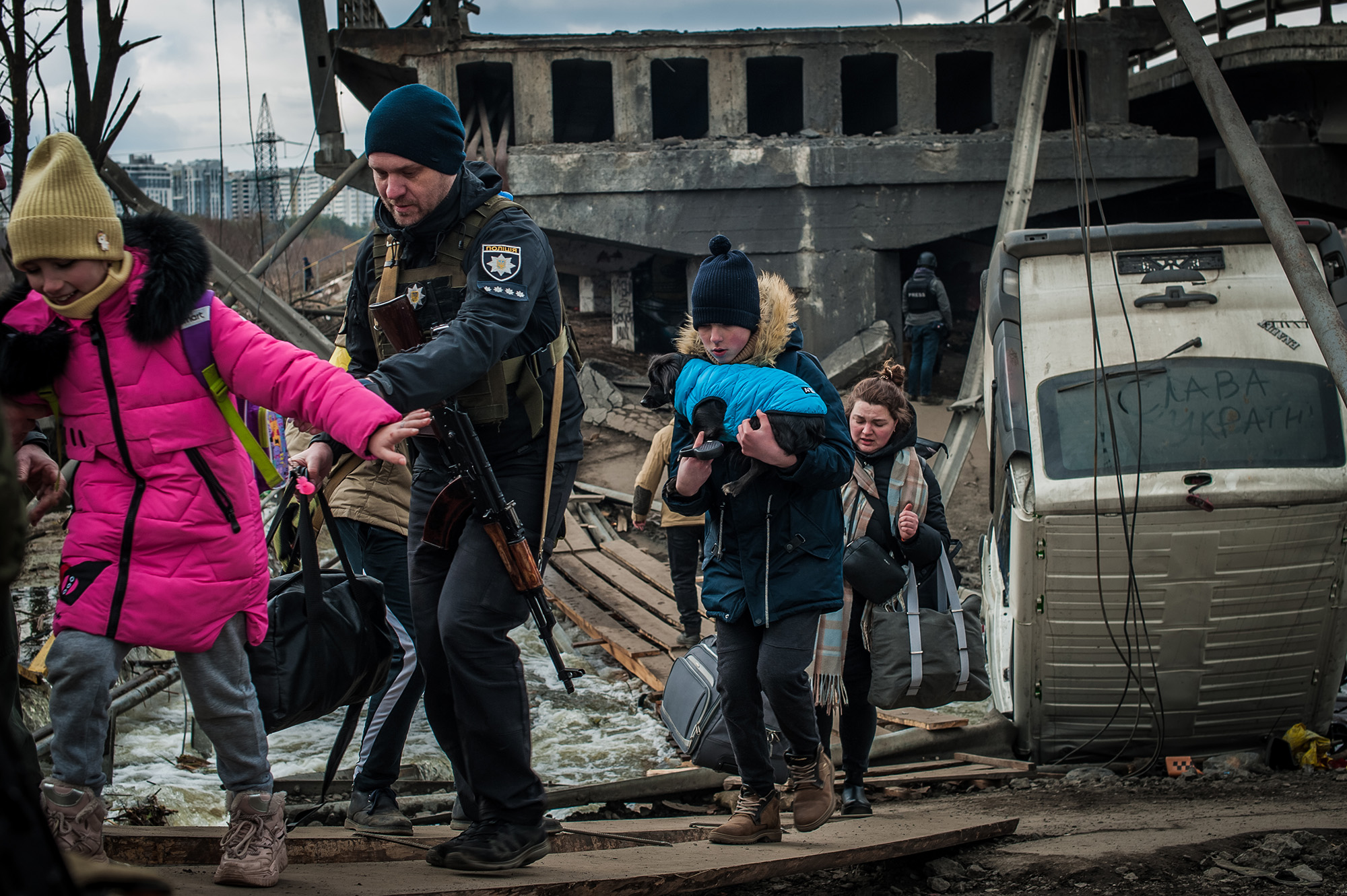
There Were Four People. Only the Mother Survived
Several days ago, on the outskirts of the town of Irpin in Kyiv region, the Russian military opened fire at civilians trying to leave the town. There alone at least eight people were killed. Despite constant fire and shelling, the evacuation of civilians continues—staying in the town, as well as in neighboring Vorzel, Bucha, Borodyanka, and Hostomel means risking your life every moment. Houses become the targets for Russian airstrikes—countless have been destroyed. Those killed remain under ruins, they cannot even be buried.
In the first days of the full-scale invasion, the Ukrainian army blew up several bridges on the roads approaching Kyiv. One of them was the Irpin bridge. It is under its remains that the people of Irpin hide from Russian army shelling. Risking their lives, people try crossing the destroyed bridge to relatively safer places, wherefrom they can move on.
“If you hear the whistling, just duck. If it sounds like muffled cracking, it means that it is close. Duck, cover your head with your hands, and then run,” says my friend Volodya. He explains this way how close the shell is flying.
Volodya is a former serviceman. He served with his unit near Avdiivka. Later he became a photojournalist. He took us to the suburbs of Irpin to witness the evacuation of civilians from Bucha and Irpin. But we were not allowed as far as the checkpoint, so we stationed ourselves a few hundred meters from the town entrance.
“Turn!” screams the man in military uniform, firmly pressing his assault rifle to his chest. He is waving at us right in our windshield. Policemen near him drop on the ground. We have no time to understand anything. We turn around and park our car on the side of the road. There are a few more journalists standing there.
The whistling. This time we hear it. We crouch behind the car of one of the filming crews. Then the whistling stops, so we can stand up from the damp spring sand. We see two men on bikes riding towards us from the direction of Irpin, one of them holding a big German shepherd on a leash. The dog calmly follows his owner.
A group of boys are walking the same trail. They are young, not older than 20. They are carrying big sport bags.
“Are you from Irpin?” I shout to them when they come closer.
“Yes,” answers one of them. “We are walking from the town, we live there. We did not want to get into cars to save space for the evacuation of children.”
The boys catch their breath. I keep looking at their bags.
“Are you, boys, athletes?”
“Yes, we practice Taekwondo in Irpin.”
I ask their permission to take a photo of them all together. They agree and wonder if the photo came out well. Then we part.
***
“Behind the car, behind the car!” screams Jack, a safety advisor for one of the journalist crews from the UK. Jack is calm, he served in Afghanistan, Iraq and Sierra-Leone, guarding the ambassadors. Jack was calm to all previous whistling sounds, but when we heard that muffled cracking he told us to leave. “It’s time now.”
Nobody argues with Jack. We board the bus. The driver hits the gas pedal. As we speed on, the green pine branches mix in peripheral vision looking like blurred watercolor smears on canvas. We ride even faster. Only afterwards, on the balcony of a friend’s flat, I will learn that it was the actual shelling. And it was not poetic at all, there is no romanticism in shelling. Resting your feet in the mud, in your favorite pants you used to wear in peaceful Kyiv just recently, you look for familiar eyes and hope for the better.
Our bus returns from Irpin to the Kyiv outskirts. Here, to the checkpoint with the icon of Mary and baby Jesus standing among the concrete blocks, the big gray police and regular yellow buses bring those who managed to evacuate. People are everywhere. They are crying, screaming, and looking at the road.
There is a woman standing next to me. She has long black hair with strands of gray. She is covering her lips with the fingers of her right hand. Her lips, her hands, her face—everything is shaking from her tears. First they roll down into her big dark eye bags, then on her skinny face, seeking the best place to drop down. She is waiting for her father. The woman managed to escape, but he did not. There are many stories of this kind.
***
Further away from us stands a family: a mother and her son. The teenage boy is trying to calm his mother down. She is in tears. She cries because her parents remain under the Irpin bridge. They are both over 80. Both with disabilities. Her dad needs diapers.
“I escaped with my son. And they stayed. They are there now. How will I live without them? My husband went for them. I just couldn’t take them. I just couldn’t. But if they stay there, they will die. Who will take them? They are disabled, nobody will walk them across the bridge. They will never cross it.”
She cries and talks without a stop. I try to calm her down, explaining that the evacuation is still in progress, people are being helped to cross under the bridge, and the military are helping too. But it does little good.
The words of her son, who is trying to bring her to senses, are not much help either.
“Thank you,” the woman keeps saying. “Thank you.”
But there is hardly anything I can do for her, I saw neither her father, nor her mother. I have no idea where they are, and just try to tell her to believe and hope.
Just as I look away, the car arrives on the right. The door opens, and volunteers carry out a man. He is as white as chalk, his face looks sickly. Yet he still tries to walk on his own. Then he falls on a concrete block. A doctor comes, he tears apart the man’s pants and tries to bandage his red wound.
“It’s ok,” he says briskly.
A woman holding the man from behind takes a bottle, gets a mouthful of water, spits it in her palm and washes his face. He does not react. He lies with his eyes closed.
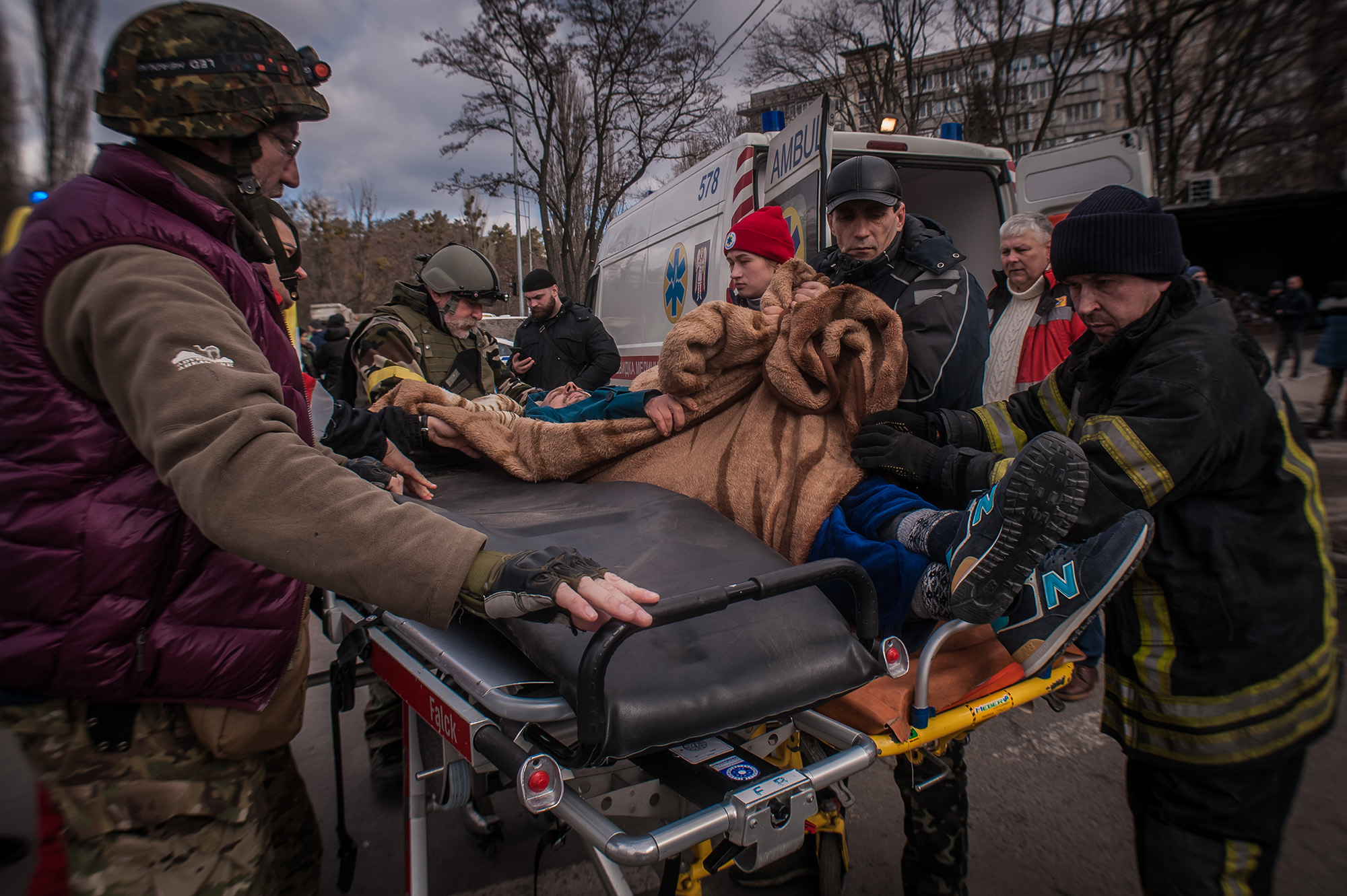
There is an ambulance nearby. Its doors are stained with blood. There is a young man inside, he was wounded in the shoulder. Before carrying him in, they had to cut off his soldier’s rifle shoulder strap. He could not take it off himself, he said it hurt. Camouflage near the wound became dark red, brown spots on top of green.
Then followed another man, asking not to film the wounded. It must be his friend, because the rifle with the cut strap is handed over to him. He takes the weapon and stands beside the ambulance, absolutely flat-eyed. He stood there all the time while the wounded boy was in the ambulance.
A little girl interrupts the fuss around the ambulance with her scream. She is wearing a warm brown sheepskin coat and a knitted hat. I hear someone calling her “Ulyana.” Ulyana does not breathe, she screams. Her scream is so loud, I can hear it among the other voices and cars. Ulyana screams with every exhale. Screams, again and again, as if passing the cold air through her throat and wanting to get rid of it as fast as possible. Then she finally calms down, embraces her arms round her dad’s neck, and asks why there are metal “hedgehogs” on the road.
***
“Good day!” a man in glasses says to me. I can see from his face that he has not shaved for several days.
“Mr. Alexander!” I smile at him, recognizing my university teacher from Kyiv-Mohyla Academy. “What are you doing here?”
“I help drive people to the railway station.”
We hug each other. I have not seen him for a while. He got older.
“Tanya. . . I. . . Before the war I translated Barack Obama’s book ‘A Promised Land.’ I. . .”
My teacher starts crying. Adult, intelligent, always sarcastic, he turns away from me wiping the tears with his fingers. Could I have thought I would ever see his tears? Could I think that one day I will be comforting my teacher, who usually comforted us, or otherwise, scolded? I have no words for him, I do not know how to support him, so I just hug him one more time.
***
We go to the car that has just arrived from Irpin. The driver seeks passengers offering to take them to the railway station. His small car can take four people. Then I meet eyes with a limping man. His leg is bandaged, and blood shines through the bandages.
“What happened to you?” I ask.
The man stops. He has big blue eyes. And an assault rifle in hands.
“I was helping a family cross the bridge. There were four of them. Only the mother survived. I wanted to give the kid. . . a chocolate. And she was killed by two pieces of shrapnel. All three are killed in action. I was wounded by shrapnel.”
The man limps away. Then he boards the bus and leaves.
Then I see that woman again who was waiting for her parents. They finally came. She walks with them, crying. Her father with a long bare neck smiles and winks. The woman laughs.
“They came, thank you,” says the woman and hugs her parents.
Her father laughs again. They have all survived and are now together. Everyone who left for Kyiv that day went through a non-existent “humanitarian escape corridor.” There was no “corridor.” These people evacuated under shelling. That day, Russia violated its promise not to shoot. Once again.
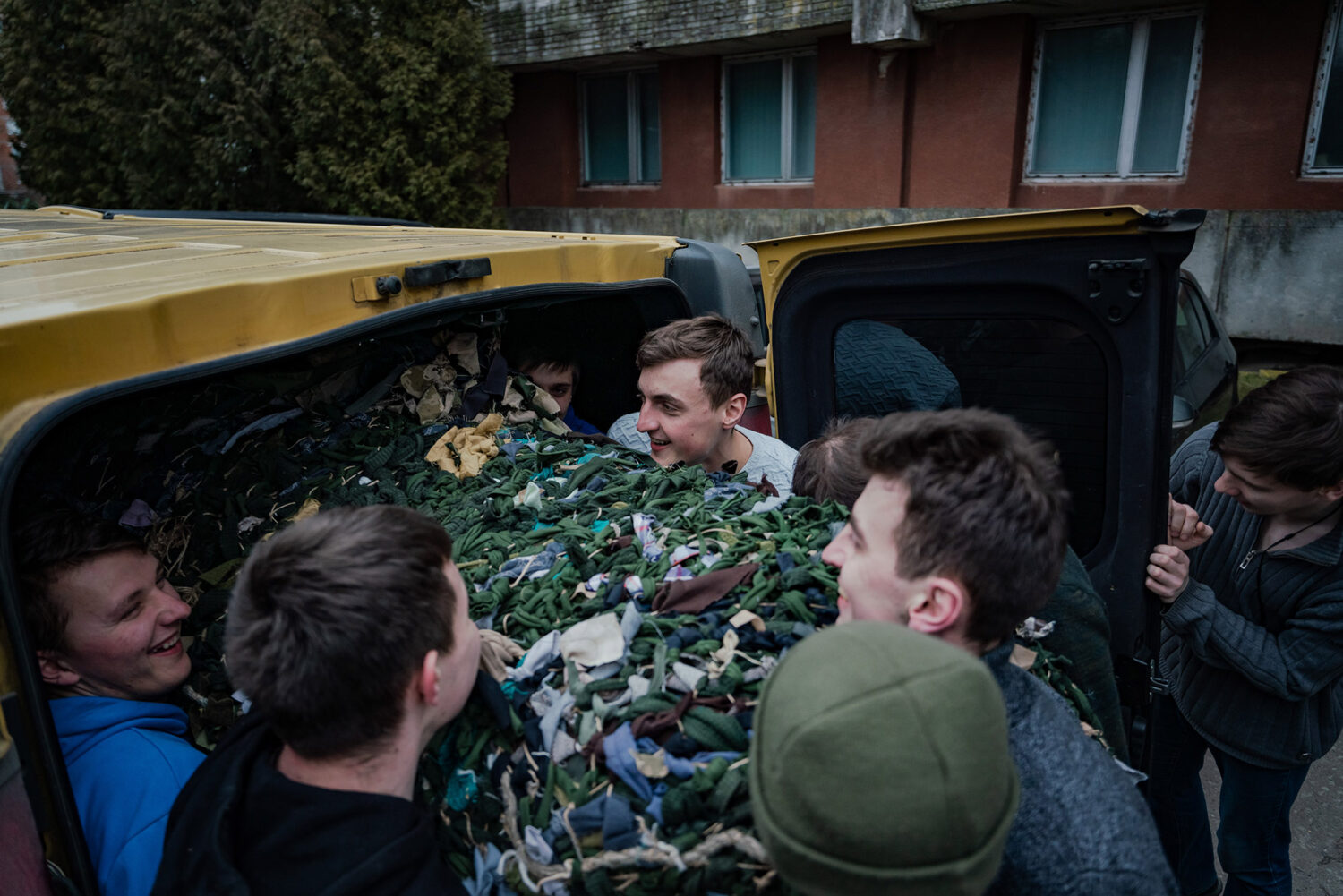
Have read to the end! What's next?
Next is a small request.
Building media in Ukraine is not an easy task. It requires special experience, knowledge and special resources. Literary reportage is also one of the most expensive genres of journalism. That's why we need your support.
We have no investors or "friendly politicians" - we’ve always been independent. The only dependence we would like to have is dependence on educated and caring readers. We invite you to support us on Patreon, so we could create more valuable things with your help.
Reports130
More





